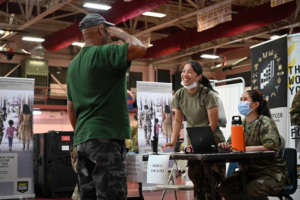Duke undergraduates partner with medical professionals to deliver essential healthcare services to underserved areas through Remote Area Medical, demonstrating how student advocacy and volunteer coordination can transform access to medical care in remote parts of North Carolina.

Duke Remote Area Medical (RAM), a student-led branch of the national organization, works to address healthcare barriers in medically underserved communities across North Carolina. Several times a year, Duke undergraduates travel to remote areas to assist medical professionals in providing free services ranging from eyeglass fittings to dental procedures.
The organization operates through two branches: a general executive team that organizes volunteer trips and a community host group managing a clinic in Henderson, NC. Students like dental recruitment director Priyanka Patel coordinate with local healthcare providers who volunteer their expertise.
“The patients are always such a pleasure to interact with and talk to,” Patel said in an article in The Chronicle, a student-run newspaper. “They are really grateful for the service we are offering them. They aren’t, unfortunately, able to get these services anywhere else.”
Their impact is substantial. At a March pop-up clinic in Henderson, RAM provided 195 patients with prescription eyeglasses, conducted 84 general medical exams, and performed 90 tooth extractions, alongside other services like cleanings and dental X-rays.
Since 1985, the national Remote Area Medical organization, founded by Stan Brock, has provided free healthcare services through pop-up clinics around the country. RAM delivers dental, vision, and general medical services. So far, RAM has served almost one million individuals who lack access to or cannot afford healthcare, operating on a first-come, first-served basis with no ID required.

Building community trust is essential to RAM’s mission. Junior Grace Wang, the media and promotions officer, works with local newspapers, radio stations, schools, and libraries to reach vulnerable populations. Wang described her outreach work as “eye-opening,” noting that “little things, like surprise bills or small accidents, can actually have a really catastrophic, avalanche effect,” revealing significant gaps in the healthcare system.
Beyond direct service, RAM engages in advocacy work on Duke’s campus. Senior Sahith Kudaravalli and the advocacy team make healthcare policies accessible to students, host discussions on legislation, and facilitate letter-writing campaigns.
“It’s also about addressing all these different barriers that they might face from a social and political system and how that can have as much of an impact on their care,” Kudaravalli said in the article.
Read the full article by Madera Longstreet-Lipson in The Chronicle: Duke Remote Area Medical: The student group addressing barriers to health care in NC’s medically under-resourced communities
Related Articles

UC Students Bring Free Healthcare to Cincinnati’s Doorstep
The University of Cincinnati’s Remote Area Medical chapter organized a free clinic serving 235 patients. Their efforts highlight the critical need for accessible healthcare in both rural and urban communities.

Remote Area Medical Founder Stan Brock Honored Posthumously
Remote Area Medical, founded by Stan Brock in 1985, has revolutionized free healthcare delivery to underserved communities. Brock’s induction into the Tennessee Health Care Hall of Fame recognizes his pioneering efforts in breaking down barriers to medical access across America.

U.S. Servicemembers Provide $2M in No-Cost Medical Care to Virgin Islands
Approximately 240 servicemembers from across the United States provided no-cost health care to more than 2,000 Virgin Islands residents June 1-9, many leaving behind their civilian jobs such as doctors, dentists and optometrists.
